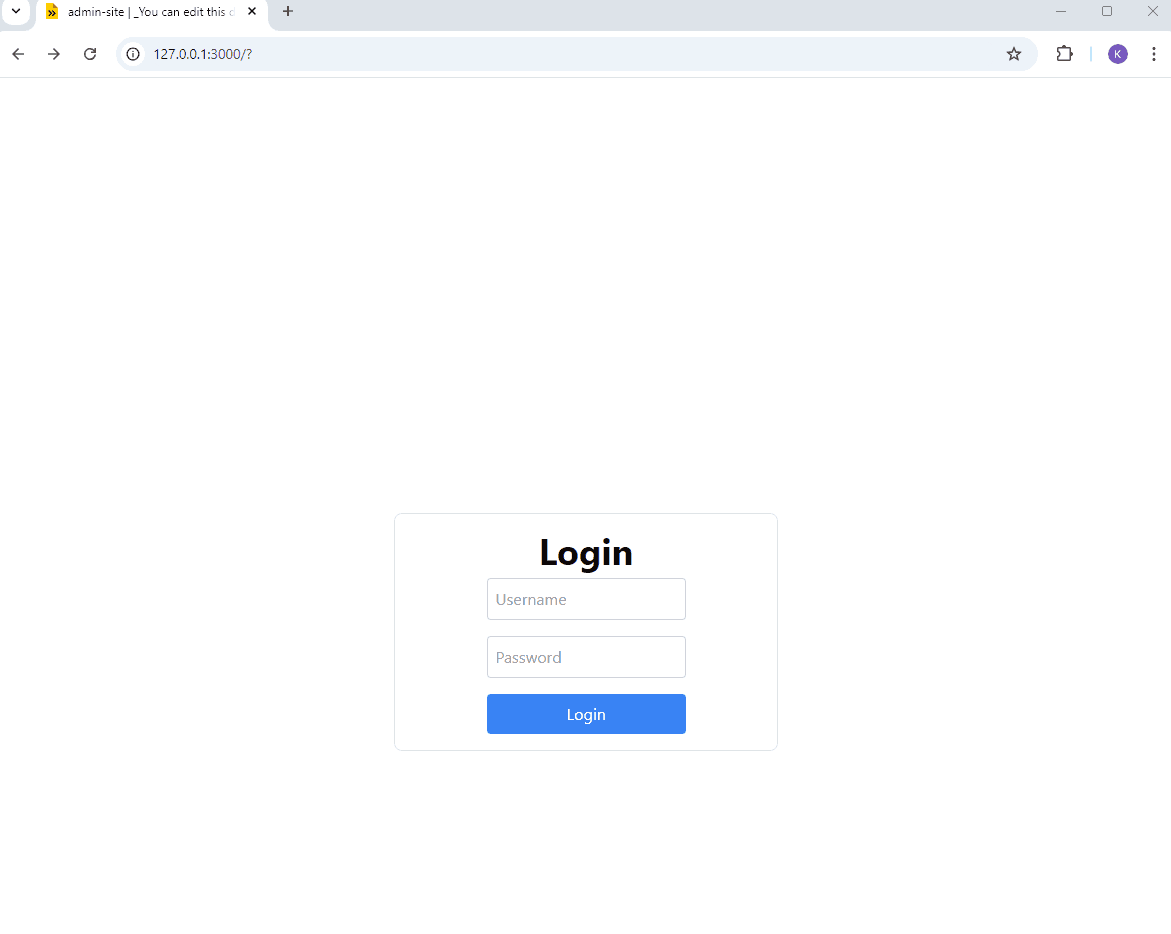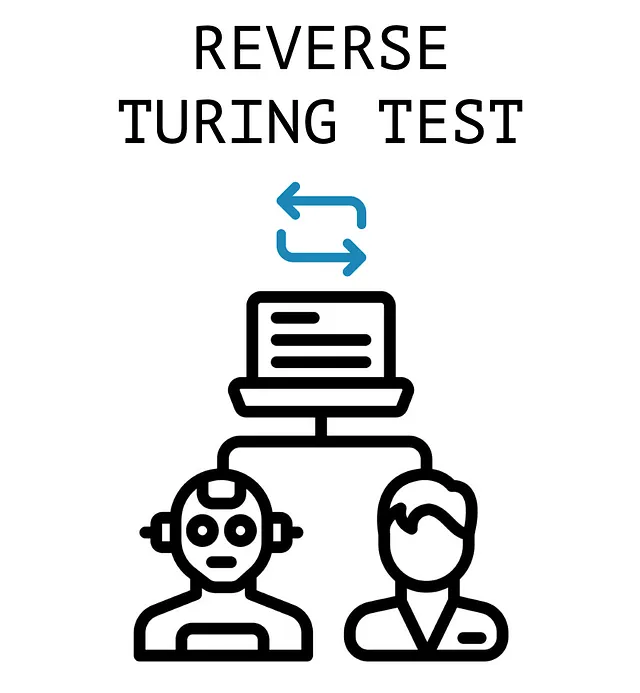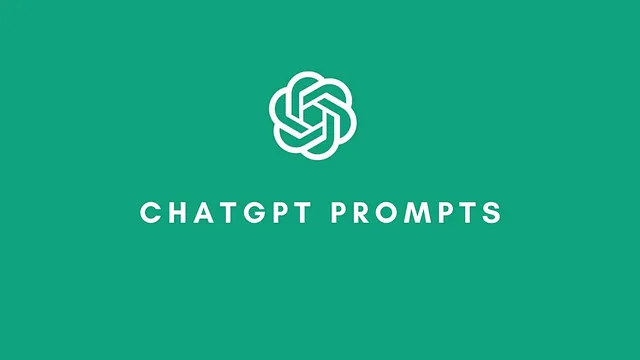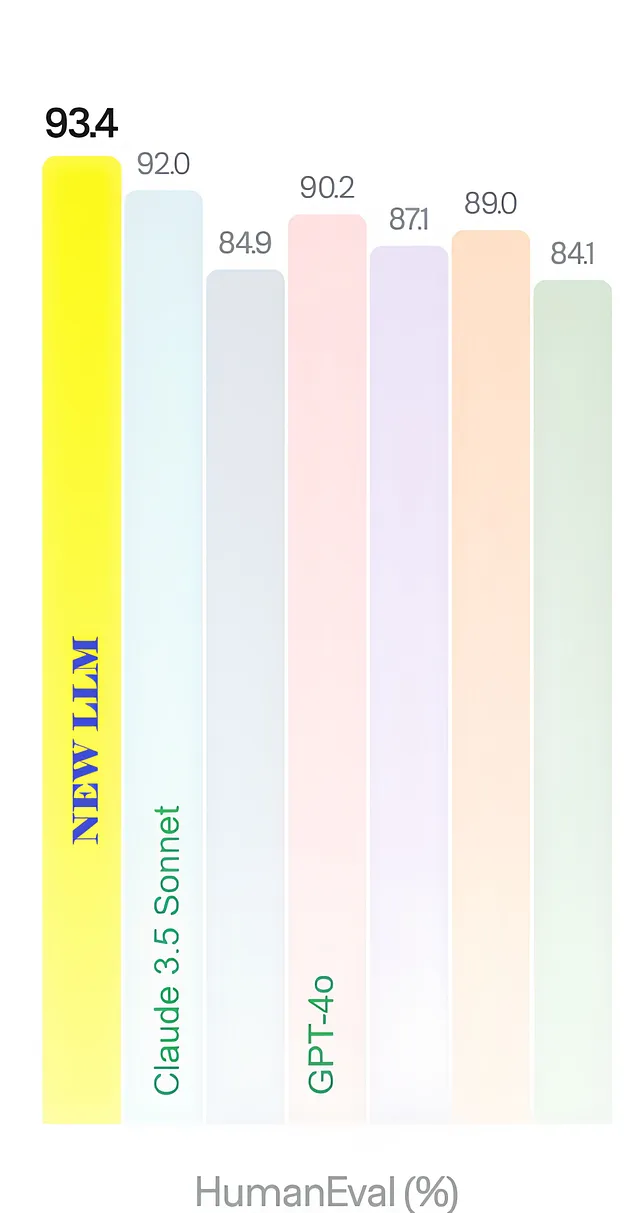大型语言模型(LLMs)在代码分析中的便利性使用ChatGPT o1
代码分析是软件开发中的一个重要过程,用于检测错误并优化代码。然而,随着代码变得更加复杂,人工分析可能会变得耗时,导致错过错误和优化机会。这就是LLMs(大型语言模型)发挥作用的地方,这是一种人工智能技术,可以借助其卓越的自然语言处理能力显著改善代码分析。
理解和自动代码分析
经过大量数据集训练的LLMs非常灵活,能够处理各种编程语言。这不仅使它们能够检测语法错误,还能执行高级分析,比如:
理解代码意图:
LLMs可以用自然语言解释代码的目的和上下文。例如,它们可以描述函数或类的意图,指出设计缺陷,并识别效率低下的地方。
代码改进建议:
LLMs可以分析书面代码并建议重构以提高性能或安全性。例如,它们可以检测低效算法并推荐更高效的替代方案。
自动化错误检测LLM具有识别代码中模式和识别潜在错误的能力。它们可以检测复杂的错误和静态分析工具可能会忽略的库之间的不兼容性。此外,LLM可以提供具体的错误消息和解决方案,大大减少开发人员的调试时间。
自动生成文档 当文档不足时,LLM可以从现有代码直接自动生成函数的解释和使用指南。这提高了代码的可读性,并使其他开发人员或未来维护更容易。此外,LLM可以提供如何使用函数和类的具体示例,简化新开发人员的入职流程。
总结和可视化复杂代码LLMs能够从大型代码库中提取关键组件并进行总结。例如,在大规模项目中,它们可以创建摘要帮助开发人员了解重要函数和类之间的相互依赖关系。LLMs还可以与可视化工具合作,以图形方式表示代码的整体结构,使人们更容易理解复杂系统,并使开发人员能够更快速地专注于特定问题。
在传统的代码审查中,开发人员必须彻底检查团队成员编写的代码并识别问题。通过使用LLMs,代码审查所需的时间可以显著减少。LLMs可以自动分析提交的代码,标记违反样式指南的区域,检测潜在的错误,并指出性能问题。它们还可以确保代码与现有架构和设计模式保持一致,从而改善代码质量的一致性。
用法
用以下方法来分析本地存在的代码。
go run main.go -local_repo_path /path/to/local/repository
直接分析托管在 Git 上的代码,请使用以下方法。
go run main.go -local_repo_path tkc/llm-repository-loader
以下文本将被生成。
----
cmd/main.go
package main
import (
"flag"
"fmt"
"os"
"path/filepath"
"strings"
"tkc/llm-repository-loader/internal"
)
func main() {
remoteRepo := flag.String("remote_repo", "", "Path to the GitHub repository (e.g., tkc/go_bedrock_proxy_server)")
localRepoPath := flag.String("local_repo_path", "", "Path to the local repo")
flag.Parse()
if *remoteRepo == "" && *localRepoPath == "" {
fmt.Println("Error: You must specify either a remote repository or a local repository.")
fmt.Println("Usage: go run main.go [-local_repo_path /path/to/local/repo] [-remote_repo tkc/go_bedrock_proxy_server]")
os.Exit(1)
}
// Find the project root where go.mod exists
projectRoot, err := internal.FindGoModRoot()
if err != nil {
fmt.Printf("Error: %v\n", err)
os.Exit(1)
}
// Define the output directory in the same location as go.mod
outputDir := filepath.Join(projectRoot, "output")
if err := os.MkdirAll(outputDir, 0755); err != nil {
fmt.Printf("Failed to create output directory: %v\n", err)
os.Exit(1)
}
var repoPath string
if *remoteRepo != "" {
// Download and extract remote repo if specified
repoPath, err = internal.DownloadRemoteRepo(*remoteRepo)
if err != nil {
fmt.Printf("Error downloading repository: %v\n", err)
os.Exit(1)
}
fmt.Printf("Repository downloaded and extracted to %s\n", repoPath)
} else if *localRepoPath != "" {
// Use local repository if specified
repoPath = *localRepoPath
fmt.Printf("Using local repository at %s\n", repoPath)
}
ignoreFilePath := filepath.Join(projectRoot, ".loader_ignores")
var ignoreList []string
if _, err := os.Stat(ignoreFilePath); err == nil {
ignoreList = internal.GetIgnoreList(ignoreFilePath)
}
fmt.Print(ignoreList)
outputFilePath := filepath.Join(outputDir, strings.ReplaceAll(filepath.Base(repoPath), "/", "_")+".txt")
outputFile, err := os.Create(outputFilePath)
if err != nil {
fmt.Printf("Error creating output file: %v\n", err)
os.Exit(1)
}
internal.ProcessRepository(repoPath, ignoreList, outputFile)
outputFile.WriteString("--END--\n")
fmt.Printf("Repository contents written to %s\n", outputFilePath)
}
--END--如果您要求ChatGPT o1-mini“重构以下代码”,它可以根据整个代码执行重构。
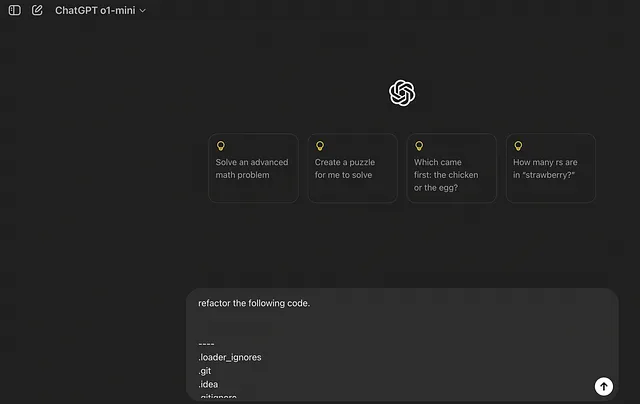
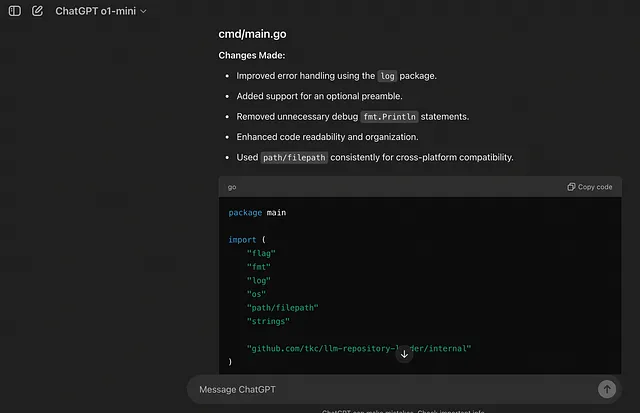
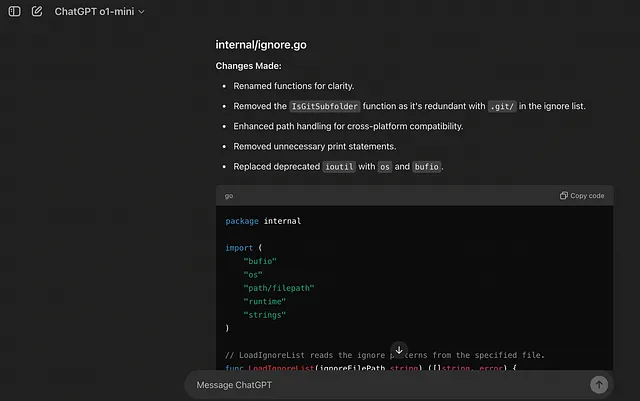
结论
具有先进的自然语言处理能力的LLMs正在革新代码分析领域。它们提供了深入洞察、自然语言解释和优化建议,这是传统工具无法实现的。因此,LLMs有潜力显著提高开发人员的生产力。预计LLMs的整合将在软件开发的未来变得不可或缺。
